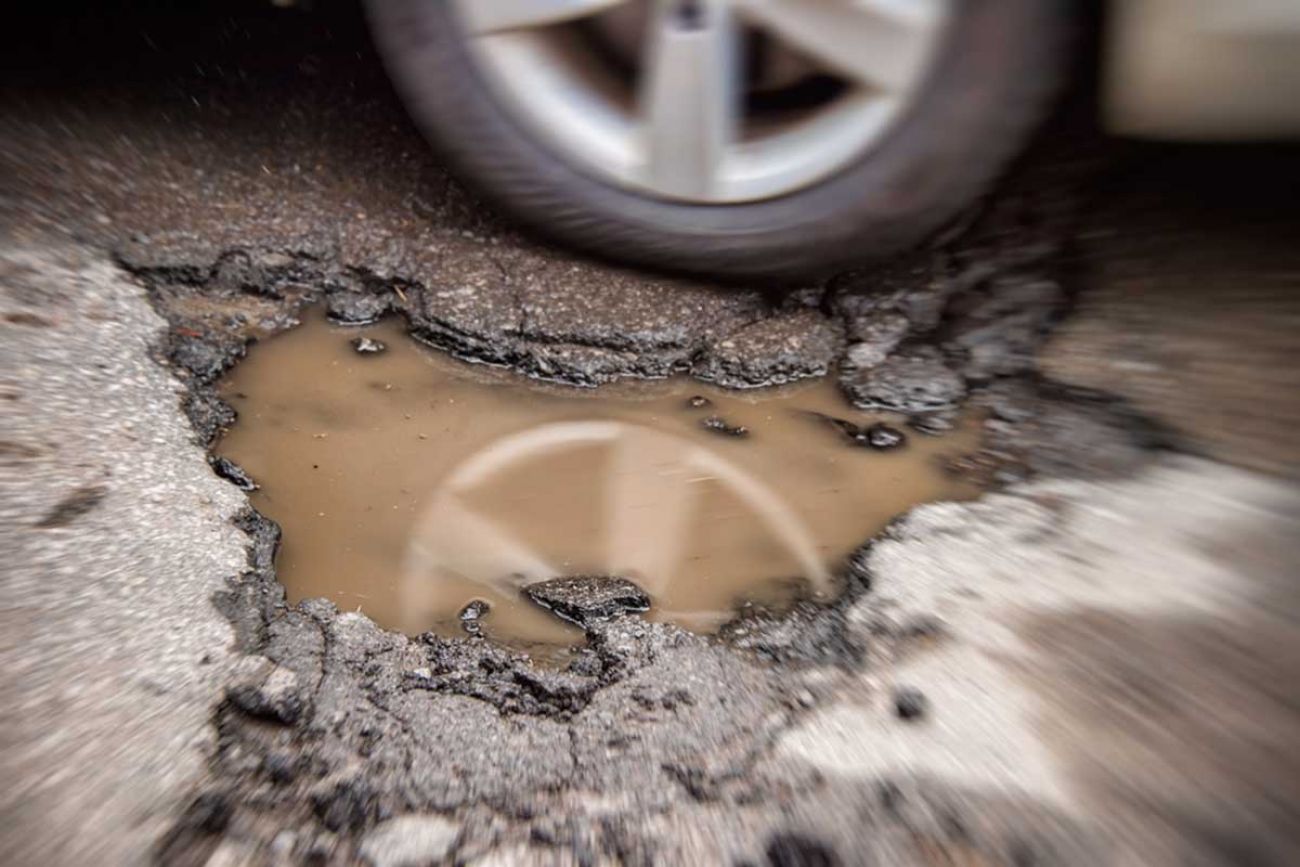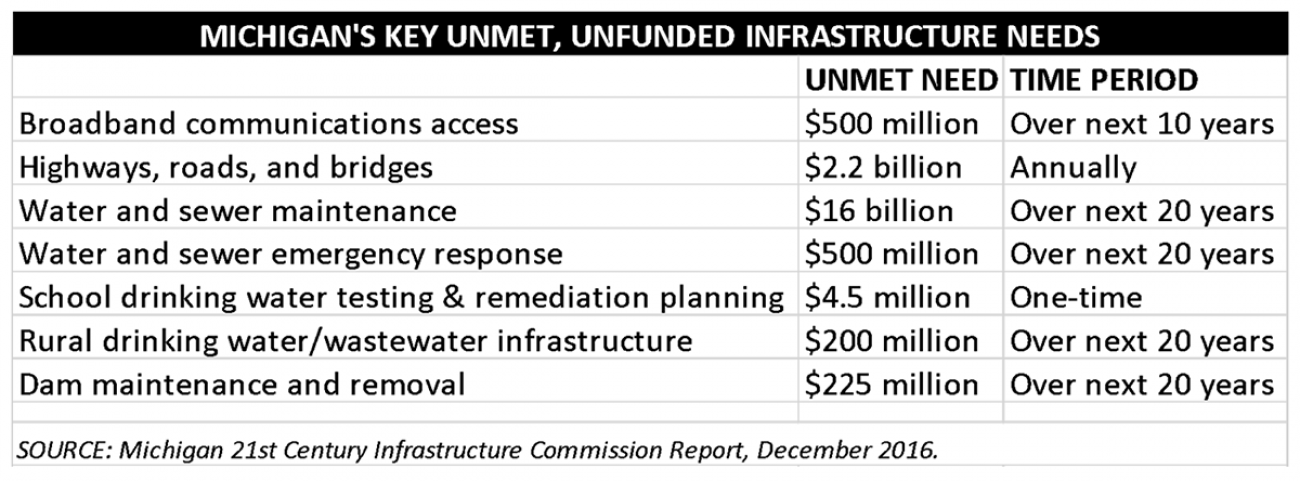Michigan needs $4B more per year for infrastructure, but how to pay for it?

A sobering statistic about Michigan’s decaying infrastructure: The state needs to come up with at least $4 billion more each year for decades for upkeep of roads, bridges, water and sewer systems, and communications infrastructure.
That’s the conclusion of the 21st Century Infrastructure Commission, a nonpartisan expert panel appointed by Gov. Rick Snyder in the wake of the Flint Water Crisis.
We see the problem every time we drive into a pothole or read headlines about sinkholes, broken water mains and flooded freeways. Yet state leaders haven’t yet done much about the 21st Century Infrastructure Commission report released in fall 2016.
Related: Where they stand: Michigan governor candidates’ infrastructure policies
Update: Michigan’s 2018 infrastructure report card: D+
For starters, coming up with an extra $4 billion a year is a heavy lift, no matter who or which political party controls Lansing.
Quality infrastructure isn’t a partisan issue. It is fundamental to a healthy economy, affecting everything from on-time deliveries to corporate attraction. Businesses want roads and bridges and drinking water systems to be in good shape, access to high-speed internet and reliable electricity.
Our lack of attention is costing us: A 2016 report by the American Society of Civil Engineers estimated that delaying needed repairs could cost U.S. GDP nearly $4 trillion by 2025, and American households $3,400 annually in disposable income. By 2025, U.S. businesses could lose 2.5 million jobs as a result of poor infrastructure conditions, according to ASCE.
What’s at stake in Michigan…

Zoom in to see how many children tested positive in your ZIP code (add your city and MI to the search). The areas in red are where more than 5 percent of children tested had elevated lead levels, higher than Flint. (Dark red areas had 10 or more such children; light red areas had fewer than 10 children). You can use the search box to find your location. UPDATED with 2014 data
Roads and bridges
Roughly 11 percent of Michigan’s roads were in “below acceptable” condition as of 2013, according to data from the U.S. Department of Transportation’s Bureau of Transportation Statistics. And 27.6 percent of the state’s bridges were considered structurally deficient or functionally obsolete that year.
Roads and bridges primarily are funded by Michigan’s gasoline tax and fees charged to drivers for registering their vehicles with the state. Until 2015, when Snyder signed a $1.2 billion transportation package into law, the gas tax had been a flat 19 cents per gallon. The legislation increased the regular and diesel fuel taxes to 26.3 cents per gallon and ties them to inflation starting in 2022, raised vehicle registration fees by 20 percent and is scheduled to divert $600 million from the general fund to roads by 2021. Critics contend the package does not fully solve the problem and will create more budget pressure down the road. Steadily improving vehicle fuel efficiency also will likely cut into the ability of gasoline taxes to cover road funding needs in the future.
Related overage from our 2018 Michigan Issue Guide
- In Michigan, more than 150 communities are financially distressed
- Limited Internet in rural Michigan depresses student, business opportunity
- Michigan pays 18% less per citizen than nat'l average for public safety
Water and sewer
Eliminating lead service drinking water lines is challenging, not least because some communities simply don’t know where they are.
Snyder’s infrastructure commission proposed creating a statewide database that records the location and condition of various types of infrastructure systems; pilot programs are underway near Detroit and Grand Rapids.
Flint may be the case study for failed water infrastructure, but it’s not the only example. In October, a water main break in Oakland County made water unsafe to drink for more than 300,000 people. Repairs are nearly complete a year after a collapsed sewer line triggered a massive sinkhole in Macomb County. And heavy rains contributed to flooding along metro Detroit freeways multiple times in recent years, leading to commuter delays and basement sewage backups.
Broadband
About 12 percent of Michigan’s population — roughly 1.2 million people — lack access to high-speed fixed broadband internet service, which is provided via cable or wireless signal (rather than satellite or cellular connection).
Related: Need broadband in Michigan? Rural life can mean you’re out of luck
Of them, more than 900,000 live in rural parts of Michigan. In some rural counties, at least 90 percent of residents can’t connect to fixed broadband internet — compared to about 3 percent in urban areas.
A lack of high-speed internet access can cause problems for rural businesses, including efforts to attract new companies; students, who can’t access the web at home for school assignments; and homeowners, because slow internet speeds can depress real estate prices.
Who should pay?
This is the question at the heart of the debate.
Some believe state government needs to take more of a leading role when it comes to investing in infrastructure. Yet many voters and elected leaders are highly resistant to raising taxes to pay for infrastructure.
Others think user fees are the best solution — essentially, letting the people who use the system pay for it. That could include such things as calculating vehicle miles traveled as a way to pay for road repairs, increasing municipal drinking water fees or levying special millages in specific communities.
KEEP DIGGING: MORE INFORMATION ON INFRASTRUCTURE
- Bridge Magazine: “Poison on Tap: The First Book on the Flint Water Crisis.”
- Bridge Magazine: “Michigan’s Record on Infrastructure: Ignore Everything.”
- Bridge Magazine: “$4 Billion Question: How to Pay for Infrastructure Fixes?”
- Bridge Magazine: “Promised Water Investment Comes only in Drips”
- Bridge Magazine: “Water Crisis Hits Suburbs – ‘We’ve Been Sounding the Alarm for Years.’”
- American Society of Civil Engineers 2017 Michigan Scorecard.
- American Society of Civil Engineers 2016 “Failure to Act” Report.
- Michigan 21st Century Infrastructure Commission Report.
Explore the Facts & Issues Guide:
At A Glance
Slideshows…
Education & Talent
- K-12 Student Performance: Michigan's K-12 performance dropping at alarming rate
- School Reform: Many Michigan K-12 reform ideas are jumbled, broad, or wildly expensive
- Early Childhood: Michigan preschool funding has improved, but child care still unaffordable
- Higher Ed: College funding cuts in Michigan have led to fewer students, greater debt
Economy & Prosperity
- Economy: Michigan business climate improves, but educated workforce is shrinking
- Jobs & Labor: Demand for Michigan workers is very high, but many have given up looking
- Incomes: Michigan income growth hindered by lack of college graduates
- Business: Business incentives cost Michigan millions, and it’s uncertain they work
Quality of Life
- Public Health: Michigan's adverse health trends track along racal, poverty lines
- Health Care: Health care in rural Michigan communities suffering, despite Obamacare
- Safety Net: $1B of Michigan’s welfare money goes to college students who aren’t poor
- Water Issues: Michigan's Great Lakes are good, but water concerns include lead and Line 5
- Lands & Energy: Michigan battling 22 invasive forest species, high electric bills
- Michigan Tourism: Does state make $8.33 for every $1 spent on Pure Michigan campaign?
- Infrastructure: Michigan needs $4B more per year for infrastructure, but how to pay for it?
- Cities: In Michigan, more than 150 communities are financially distressed
- Rural Michigan: Limited Internet in rural Michigan depresses student, business opportunity
- Public Safety: Michigan pays 18% less per citizen than nat'l average for public safety
Government & Reform
- Michigan Taxes: Michigan gives more tax breaks than it collects for schools, government
- State Spending: Big government? Michigan's state, local workforce 2nd smallest in nation
- Ballot Issues: 2018 Michigan ballot initiatives may decide marijuana, gerrymandering
- Gov't Reform: Despite low trust of gov't, Michigan legislators have done little to change
Who We Are & The Facts on Our Facts
See what new members are saying about why they donated to Bridge Michigan:
- “In order for this information to be accurate and unbiased it must be underwritten by its readers, not by special interests.” - Larry S.
- “Not many other media sources report on the topics Bridge does.” - Susan B.
- “Your journalism is outstanding and rare these days.” - Mark S.
If you want to ensure the future of nonpartisan, nonprofit Michigan journalism, please become a member today. You, too, will be asked why you donated and maybe we'll feature your quote next time!

